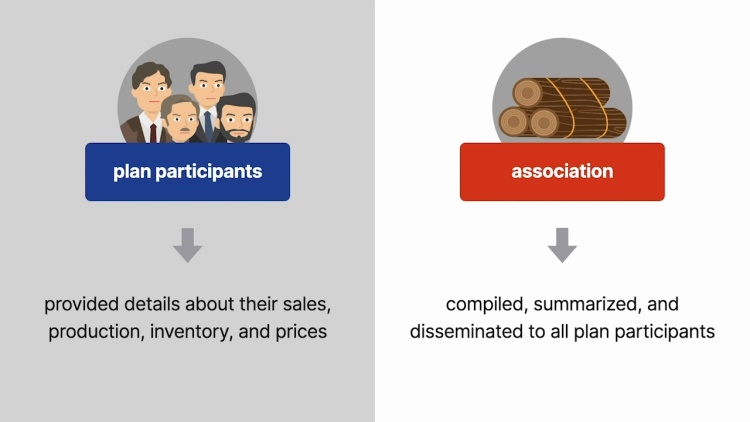American Column & Lumber Co. v. United States
United States Supreme Court
257 U.S. 377 (1921)
- Written by Tom Syverson, JD
Facts
In 1918, the American Hardwood Manufacturers’ Association (AHMA) instituted an open-competition plan (the plan). The plan created a system for hardwood lumber producers to share information. The plan was optional, but 365 members of the AHMA joined the plan (defendants). Plan participants would send detailed information about sales, inventory, and prices to the AHMA secretary. The AHMA secretary then compiled, summarized, and disseminated this information to the plan participants. The secretary also issued market-report letters that contained statistical analyses of present and future market conditions. The plan participants attended regular meetings to discuss market conditions and production levels. Through these communications, the AHMA also issued opinions and suggestions for conducting business. In 1919, shortly after the plan’s adoption, the price of hardwood lumber rose significantly. The United States (plaintiff) sued the defendants, arguing that the plan violated the Sherman Act’s prohibition on combinations in restraint of trade. The United States pointed to evidence that, during meetings, the defendants had blatantly suggested that restricting production and increasing prices would be profitable. The district court entered an order enjoining the AHMA from continuing the plan. The AHMA appealed directly to the United States Supreme Court.
Rule of Law
Issue
Holding and Reasoning (Clarke, J.)
Dissent (Holmes, J.)
Dissent (Brandeis, J.)
What to do next…
Here's why 905,000 law students have relied on our case briefs:
- Written by law professors and practitioners, not other law students. 47,100 briefs, keyed to 995 casebooks. Top-notch customer support.
- The right amount of information, includes the facts, issues, rule of law, holding and reasoning, and any concurrences and dissents.
- Access in your classes, works on your mobile and tablet. Massive library of related video lessons and high quality multiple-choice questions.
- Easy to use, uniform format for every case brief. Written in plain English, not in legalese. Our briefs summarize and simplify; they don’t just repeat the court’s language.





